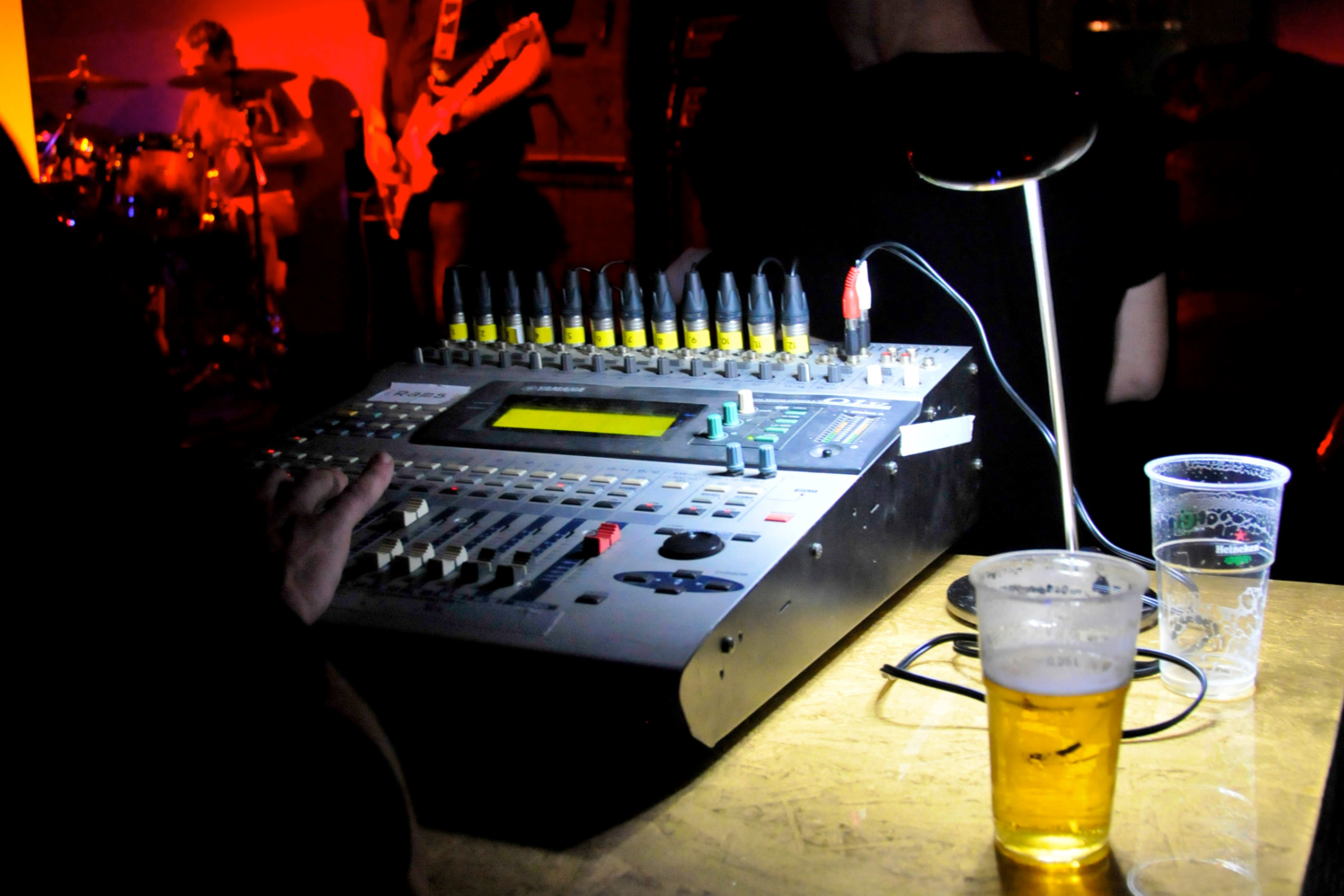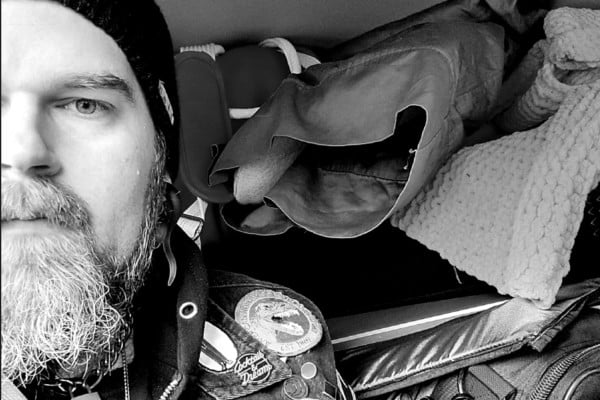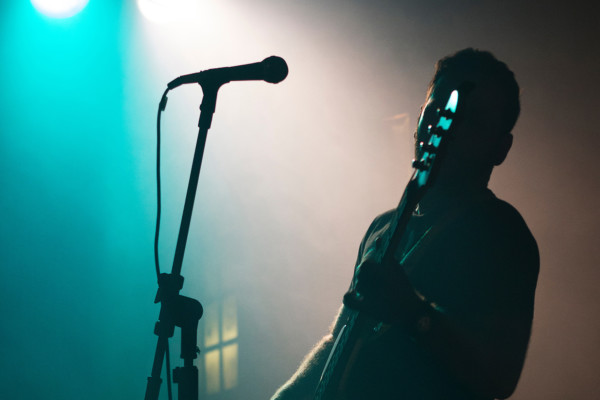Drinking on the Gig?

Q: I know that my question is very sensitive because this affects us in different ways and it might raise ideas to others I would like to ask: How does alcohol affect your playing? I do not want to hear that it is not suitable at all to play and drink (or drive) but rather what are the effects on one’s playing? These affects may be different and varied, and they are of interest because I think that people should be wise enough to compare their own feelings to others. Naturally, I know that heavy drinking affects my playing, but it is also okay to take a glass of wine sometimes. There are also times that a single sip is too much. But this is clear to most of us. So again: I want to ask what kind of effects there are? Any recorded findings while – yes – recording or similar? My fingers turn to soft sausages pretty quickly even though my mind is still crystal clear. (And I do consume alcohol very little, maybe few times a month.)
A: I wasn’t entirely sure that I wanted to try and answer this question, but it occurred to me that most people have a relationship with alcohol and that there should surely be some pertinent information online. So after a little Google-fest in my hotel room, I learned some interesting things.
While everybody has a different relationship to alcohol, there are some very definite ways in which it affects everybody, regardless of your perceived tolerance for it.
Personally, I don’t drink (well, I may have one beer about every 2-4 months when I get the urge or even a small sipping glass of good whiskey once or twice a year when it really suits the mood. But, for all intents and purposes, I consider myself a non-drinker and haven’t been a real drinker for about 20 years).
First, the obvious thing is the psychological relationship with alcohol and gigging. This is my own personal take on this, but I would imagine that most people associate having a drink with relaxing and having a good time. To this end, I can understand how just having that beer or glass of wine before the gig can help to put one in the frame of mind that they are about to have a great time and all is well. I’ve met quite a few musicians who don’t necessarily gig all that often, and as a result, each gig takes on a bit of a nervous edge. There’s a little anxiety. Not crippling, but enough to cause concern than they might be self-conscious and not be able to relax and get “in the zone.”
To this end, I personally don’t see anything wrong with having that one drink just to reframe the event cognitively. It’s a quick way to take that sense of performance anxiety and turn it into a hang; a time to have fun making music.
There are however some ways in which we are immediately affected by alcohol (even a little), and it’s good to be aware of them. This is especially true if you someone might be prone to drinking a little too much, a little too quickly (I know a lot of folks who stopped drinking because when they drink, they just start and forget to stop. This can be disastrous before a gig). It’s important to remember that you’re there to do a job, and while a little social lubrication might help you relax, if it’s getting in the way of you giving it your best, you’re not doing yourself, the band or your audience any favors.
It’s important to note that, when studied scientifically, the affects were across the board about regular drinkers and non-regular drinkers, regardless of perceived impairment by the non-drinkers.
In fact, when drinkers were given a non-alcoholic placebo, the social affects remained intact while the affects on the brain and central nervous system were un-impaired. In other words, you might try having a non-alcoholic beer if you want to get into the loose hang without impairing your brain. You can still feel like you’re having a beer without having a beer, it seems. Of course, in the study, they thought they were drinking alcoholic drinks.
Ok, on to the findings (and they are what you might expect).
There are three systems which get affected pretty much right away it seems.
- Vision: Alcohol affects the muscles in your eyes within the first few hours. While this may not seem like a big deal, it could be depending on the type of gig you are on. If you have a heavy reading gig that’s making you a bit nervous (been there), it might not be in your best interest to have too much wine, beer (or certainly anything stronger) beforehand. You could find yourself struggling to really focus on the page. When we are reading charts (especially notation), our eyes have a lot of work to do. We need to see and decipher a world of lines, dots and note-heads while also constantly scanning forward, looking to see what’s coming up, searching for that DS sign, etc.. Our eyes will be working over-time for the next few hours. No sense adding a handicap to an already difficult game.
- Hands: It seems that muscle coordination and control become affected pretty quickly to varying degrees. This seems self-evident. Our ability to play is 100% dependent upon our hands. Even a small lack of control can have huge effects on your ability to play with nuance and not just hammer out lines. You mentioned getting ‘sausage fingers’ after even one drink sometimes. This is that. It’s just the slight lack of control that makes the fine motor functions stop doing what we need them to do. There’s a lot that goes into the fluidity and vocal expression of each note and that goes out the window pretty quickly with the consumption of alcohol.
- Legs: We all know that feeling of getting up from the table and realizing that we aren’t as steady as we thought we were. While this can also be the beginnings of ‘the spins’ if we’ve drunk far too much, early on, it is often due to our legs actually weakening as we drink. The University of Notre Dame did a study and found that the leg muscles were among the first groups of muscles to weaken when consuming alcohol. This, of course, affects our balance and coordination. If you are to be standing on stage for 1-4 hours, this is pretty obvious. We have a lot of standing to do! (not to mention, balancing on one leg and manipulating pedals, etc.)
- Dehydration: Much of that stiff, sore feeling the day after a few too many is actually due to the dehydration of your muscles. When you’re on stage, if you’re anything like me, you sweat like a pig on a spit. This compounds the affects of alcohol dehydration and unless you’re pounding water on stage, it can get pretty bad. If you are continuing to suck down beers because you are thirsty (or just because it’s fun on stage and a part of the experience), you could do yourself some real harm. The affects of the alcohol on your system will be compounded by extreme dehydration. If nothing else, you’ll feel it more in the morning.
I’m not a doctor (obviously). Everyone’s systems are different. Everybody has a different level of tolerance for alcohol. However, these are a few of the things I learned poking around the web about concrete affects alcohol has on your system and how they relate to playing music on stage.
There is also the habituation of playing while high or while drinking. I know a lot of players and I’ve been around quite a few substances in my life (that’s putting it mildly, but I’m sober these days). I know first-hand the experience of feeling weird on stage because I’m not used to playing sober. Many people I’ve known have to have that drink, smoke or more because it’s a part of the experience. They’re not used to operating without it. It can actually be psychologically hard for them to feel like they are functioning at their peak without it. This may be true on an emotional and psychological level but it is 100% not true physiologically. We all know that one person who will promise that they are fine when they obviously are not. The thing is that they are in their own comfort zone. It’s where they are used to being so they don’t recognize the cognitive or physiological deficiencies. That doesn’t mean that they aren’t there, just that they aren’t being recognized. I would implore those folks to try to find a healthier relationship with it all and struggle through some sober gigs, no matter how ‘off’ the feel to retrain their habitual relationship with substances and music. It took me a while but it was worth it because, low and behold, I could play better. I’ve heard old recordings and, yeah… I wasn’t nearly as ‘in the zone’ as I thought (not even in the same league).
I’m not trying to preach, just speaking a little more personally after laying out what I found. We all have our own relationships with substances, and it’s up to us as adults to decide what our priorities are and be honest with ourselves about what we do and how that realistically aligns with what we want out of life.
I hope I answered your question sufficiently. It’s certainly not my area of expertise but I have lived on both sides of that coin and what I read seemed to confirm what conclusions I had come to years ago.
In short, there’s nothing wrong with a little performance/social lubricant but extreme moderation is the key to not hampering your ability to perform!
Afterthought: I can imagine the responses mentioning how many of our idols played at a high level while intoxicated. We can all think of performers who played beautifully and transcendently while on drugs or the drink (Hendrix, Charlie Parker, etc.) The question is how long they were able to operate at that level, in that state? I would argue that the answer is, quite often, not long enough.
Have a question for Damian Erskine? Send it to [email protected]. Check out Damian’s instructional books, Right Hand Drive and The Improviser’s Path.



